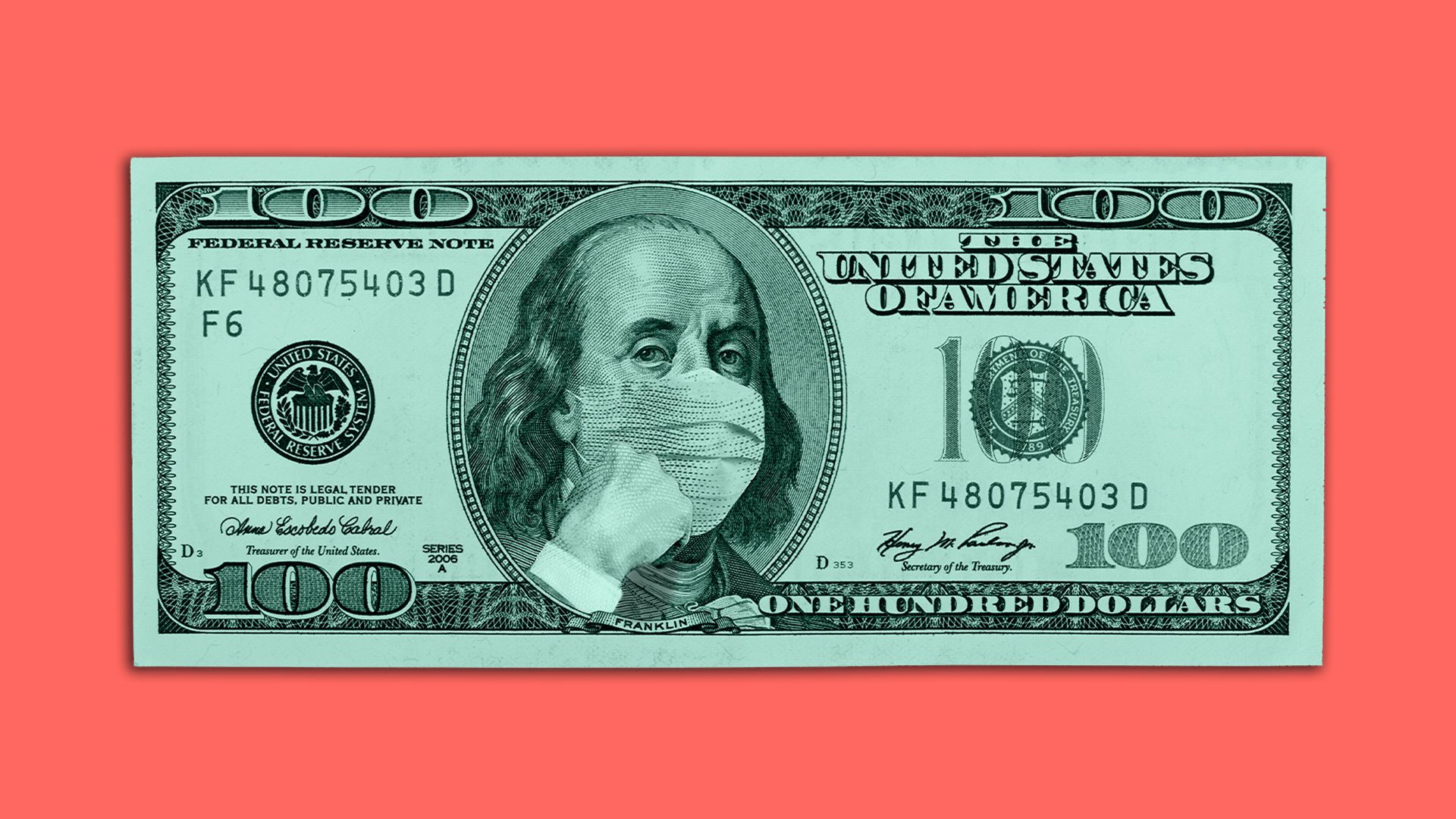| | | | | | | Presented By Aon | | | | Axios Markets | | By Sam Ro ·Aug 20, 2021 | | Today's newsletter is 1,142 words, 4.5 minutes. | | | | | | 1 big thing: The economy through retail's lens |  | | | Illustration: Aïda Amer/Axios | | | | America's most iconic retailers offered a nuanced look at how the spread of the Delta variant is affecting the economy. Why it matters: COVID cases spiked in late July and have been trending higher ever since. It's too early to draw conclusions about the current wave's impact on the economy. But patterns are emerging from the fresh anecdotes coming from corporate America. What they're saying: Macy's CEO Jeffrey Gennette addressed the differing behaviors of three types of shoppers, speaking on Macy's Thursday earnings call. - Suburban residents have been comfortable shopping as usual, and stores in these areas have been "comping ahead of 2019 levels."
- Office workers, who shop at urban locations during lunch breaks or on their way home, haven't changed much since before the current wave of infections, but could eventually be impacted as return to office plans "are always shifting." This echoes the concerns flagged last week by the foodservice giant Aramark.
- Tourists, specifically international tourists, have been largely absent at Macy's stores. This observation fits well with the fact that airlines have been seeing fewer bookings and elevated cancellation activity.
Meanwhile, Walmart CFO Brett Biggs and Target CEO Brian Cornell both made comments this week indicating consumer traffic in their stores has remained consistent over the last month. - Both companies raised guidance for the full year.
Between the lines: Walmart and Target have a more suburban footprint, and their trends are similar to Macy's stable sales in its suburban locations, Joseph Feldman, assistant director of research at Telsey Advisory Group, tells Axios. - "Home Depot and Lowe's had talked about the dynamic where they were seeing more suburban, rural-type customers more willing to go into the stores and shop a little bit more regularly," Feldman added.
State of play: So far, these have been anecdotes. According to Bank of America's debit and credit card spending data, which is a bit more comprehensive, spending growth cooled notably in the seven days ending Aug. 14. - "A main reason behind the moderation over the last several weeks has been due to a pullback in spending on leisure services, which we define as travel (airlines + lodging), entertainment and restaurants/bars," Bank of America head of U.S. economics Michelle Meyer wrote.
What to watch: The first big comprehensive report on August consumer behavior will be the next monthly retail sales report released on Sept. 16. |     | | | | | | 2. Catch up quick | | The Federal Trade Commission has filed an amended antitrust suit against Facebook. (Axios) Johnson & Johnson names Joaquin Duato as CEO effective Jan. 3. (Reuters) Apple has delayed its return to the office from October until January at the earliest. (Bloomberg) |     | | | | | | 3. Economists are concerned about Delta |  | | | Illustration: Trent Joaquin/Axios | | | | We're just over halfway through Q3, and a handful of Wall Street's most prominent economists are already hacking their forecasts for economic growth during the period. Why it matters: The U.S. has been hit with another wave of COVID cases with the spread of the Delta variant. Rising vaccination rates have helped bolster the economy, but as we hit upon already in today's newsletter, there's some early evidence that suggests growth may be cooling. What they're saying: This week, Goldman Sachs economists slashed their forecast for Q3 GDP growth to +5.5% from +9.0%. - "The impact of the Delta variant on growth and inflation is proving to be somewhat larger than we expected," Goldman Sachs chief U.S. economist David Mericle wrote.
- "Spending on dining, travel, and some other services is likely to decline in August, though we expect the drop to be modest and brief," he added. "Production is still suffering from supply chain disruptions, especially in the auto industry, and this is likely to mean less inventory rebuild in Q3."
Last week, Wells Fargo economists reduced their Q3 GDP forecast to +6.8% from +8.8%. - "Rising cases have reignited some caution surrounding the outlook," Wells Fargo economists wrote.
Bank of America economists have maintained their official Q3 GDP growth forecast of +7.0%. But following the disappointing July retail sales report, they warned that GDP growth appeared to be tracking at closer to 4.5% growth for Q3. Yes, but: Not everyone is cutting due to the spread of the Delta variant. - "We don't expect the latest COVID wave to have a major growth impact," TD chief U.S. macro strategist Jim O'Sullivan wrote this week. "We expect real GDP to slow from a still-very-strong 7% [rate for Q3]."
The big picture: Even though some forecasts are coming down, they continue to reflect an above-average rate of growth. During the previous expansion, GDP growth averaged 2.3% from 2009 to 2019. |     | | | | | | A message from Aon | | Redefining the value of intellectual property (IP) | | |  | | | | The value of a company's IP assets should be a driving force behind its business strategy in an innovation-rich economy. More info: Aon helps organizations of all stages, sizes and industries tap into this key asset class. Get more details. | | | | | | 4. A warning from the mid-Atlantic |  Data: Philly Fed; Chart: Axios Visuals In another sign that growth is cooling, manufacturing activity grew by less than expected in the Pennsylvania, New Jersey and Delaware area. Why it matters: Economists are getting concerned about how the current wave of COVID infections may be affecting growth — as evidenced by the cuts to GDP estimates. State of play: The Philly Fed's August Manufacturing Business Outlook Survey, the second of the major monthly regional manufacturing reports, showed that the rate of growth slowed as COVID has been spreading. - The report's current activity index unexpectedly fell to 19.4 in August from 21.9 in July. This was the lowest reading since December, and it was worse than the 23.0 expected by economists.
- While any number above 0 signals growth, the decline reflects deceleration.
What they're saying: "The manufacturing recovery globally is moderating, but it is not rolling over," Pantheon Macroeconomics' Ian Shepherdson said. What to watch: The Richmond Fed's manufacturing report comes on Aug. 24. That'll be followed by the Kansas City Fed's on Aug. 26 and the Dallas Fed's on Aug. 30. |     | | |  | | | | If you like this newsletter, your friends may, too! Refer your friends and get free Axios swag when they sign up. | | | | | | | | 5. Employees are too valuable |  Reproduced from PwC U.S. Pulse Survey Report; Chart: Axios Visuals Companies want to protect themselves from the impact of employees leaving in droves, Axios' Kate Marino writes. Driving the news: In PwC's latest U.S. Pulse Survey, nearly half of executives said they want to reduce their dependence on employees' institutional knowledge. Why it matters: The Great Resignation is underway, and employers are grappling with the fallout. - A whopping 65% of employees said they are looking for a new job, according to PwC's survey, conducted Aug. 2-6, of 1,007 employees and 752 executives in the U.S.
- Not surprisingly, 88% of executives said their company is experiencing higher turnover than normal.
What they're saying: Reducing dependence on institutional knowledge largely means automating more processes, said Bhushan Sethi, PwC's global people and organization co-leader, on a call to discuss the findings. - "Part of that has to do with a talent challenge," he said. And if more processes can be digitized, it also allows companies to upskill their workforces and help employees become more productive, he adds.
Bonus stat: PwC also took the temperature of receptiveness to vaccine mandates. About two-thirds of both employees and execs said they're in favor of a vaccine requirement for employees returning to the office. - Around 25% of total respondents strongly disagreed with vaccine mandates.
- But sentiment varies by region: In the Northeast, just 13% strongly disagree.
|     | | | | | | A message from Aon | | Why your company should tap into new sources of capital | | |  | | | | There is incredible untapped potential to derive capital from and protect one of any organization's most valuable assets: its intellectual property. Aon has the technology and subject matter expertise to improve the quality and diversity of capital to manage IP. Learn more. | | |  | | It'll help you deliver employee communications more effectively. | | | | | | Axios thanks our partners for supporting our newsletters. If you're interested in advertising, learn more here.
Sponsorship has no influence on editorial content. Axios, 3100 Clarendon Blvd, Suite 1300, Arlington VA 22201 | | | You received this email because you signed up for newsletters from Axios.
Change your preferences or unsubscribe here. | | | Was this email forwarded to you?
Sign up now to get Axios in your inbox. | | | | Follow Axios on social media:    | | | | | |












No comments:
Post a Comment